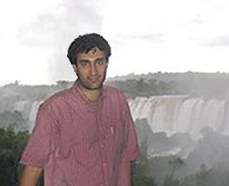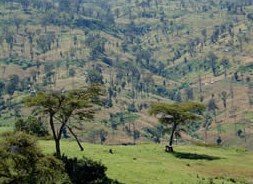Good news for rainforests. Canadian researchers have calculated that the economic benefits of protecting a rainforest reserve could outweigh costs in its conservation. The study is the first of its kind to have undertaken a simultaneous cost-benefit analysis on conservation.
Robin Naidoo, formerly of the University of Alberta and now working for the World Wildlife Fund, explains that, The traditional moral and aesthetic arguments have been made about why we should conserve the biodiversity in rainforests, but little has been done that looks at whether it makes pure economic sense to do so. Now, Naidoo and his colleagues have produced good evidence that conservation not only makes aesthetic sense, but also stacks up economically.

Robin Naidoo
Naidoo and Wiktor Adamowicz examined the costs and benefits of avian biodiversity at the Mabira Forest Reserve in southern Uganda. They wanted to see if it was economically viable to protect this forest in an area where an impoverished community is heavily dependent on the region’s resources. The pressure on the forest is intense as timber is continually harvested for making charcoal, wood fuel, and for agricultural development. All such activities seem to be at odds with the conservation of the forest.
However, since 1996, an ecotourism centre has been established at the forest and a growing number of international tourists visit the reserve. Naidoo and Adamowicz found that the greater the number of bird species, the more tourists would be willing to pay to visit the reserve. By simply increasing entrance fees, the reserve could preserve 90%, or 131 species, of the forest’s birds. The researchers point out that a higher entrance fee reduces the number of tourists, but nevertheless increases revenue. Moreover, fewer visitors mean less negative impact on the reserve.

Wiktor Adamowicz
For the first time, perhaps, people put a tangible number on what these rainforests are worth to them, Naidoo explains, adding that the benefits should be distributed to the local people bearing the conservation cost. And although this is about a Ugandan forest, it has international implications. Adamowicz cautions that while claims that the benefits far outweigh the costs is something of an overstatement. In fact if one attempts to set the conservation target too high, the benefits are lower than the costs, he told Spotlight.

Rainforest
Further reading
Proc Natl Acad Sci, 2005, in press
http://dx.doi.org/10.1073/pnas.0508036102
Vic Adamowicz
http://www.ales.ualberta.ca/re/vic_adamowicz.cfm
Robin Naidoo — Senior Conservation Fellow
http://www.worldwildlife.org/science/staff/item5139.html